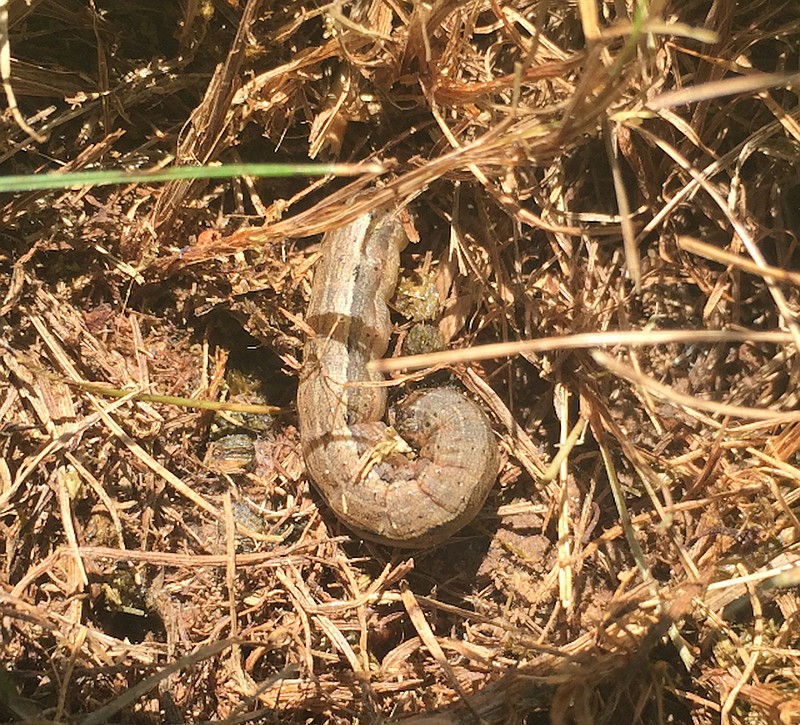Remember the predicted cicada invasion? Four months ago, experts told us the 13-year type (or was it the 17-year type, or both?) would be swarming across the Volunteer State this summer.
Brood X (meaning 10, like the Roman number) was to produce up to 1.5 million of the insects per acre in states from New York to Illinois to Georgia, and including Tennessee.
The creatures, often confused with locusts, aren't dangerous to humans and are not major threats to plant life like the grasshopper-relative with which they are often confused.
But the swarm never materialized. Oh, there were numerous reports but nothing to match the prodigious predictions put forth in the spring.
Now, though, it appears a different uncalled for and unwelcome pest actually has arrived - the armyworm.
This newspaper reported Friday that the caterpillar-like creatures are devouring the grass of area homeowners and giving lawn care companies more business than they can handle.
One local lawn care guru said they can devour an area the size of a football field in 24 hours.
That's some appetite.
Why they're not a problem here every year is a mystery. Indeed, a check of newspaper archives indicates their widespread lawn devastation, if not their mere presence, is more rare than the 13-year (or was it the 17-year) cicada.
But it wasn't always that way. In fact, newspaper archives mention the little demon - spelled with two words before recent years - as far back as 1873.
And back in those days, and for about the next 100 years, the majority of mentions of the armyworm have come in relation to crops. Whatever was grown in our then-largely rural state - cotton, wheat, millet, corn, peas, etc. - was a frequent annual feast for the pests.
So apparently well known were the creatures that they occasionally found mention in the cultural humor of the day.
In an 1883 Chattanooga Daily Times, for instance, a humorous story tells of a young St. Louis woman engaged to an Army officer who is upset because he hasn't written her in three days. Her friend reassures her that "he is out of reach of Indians" and in apparently good health, so all is likely fine. "Oh, yes, I know all that, Lizzie," she said, "but then there's the army worm."
In a 1907 Sunday Daily Times, among what appeared to be tongue-in-cheek Society Notes, a "Miss Amelia Wishbiddle writes to our society editor that she notes, in addition to the presence of the army worm and the locusts, there is a tendency among the young men of her acquaintance to complain of cold feet. Miss Wishbiddle says she has found it necessary of late to frequently accompany herself to the various social functions to which she is invited."
And in a 1938 Chattanooga Daily Times, an editorial cartoon carrying the headline "The German Army Worm!" depicts Adolf Hitler spraying poison on a German man with a caterpillar-like body tagged "Old Army Caste" who is perched on a tree tagged "Tree of Power."
In the last 50 years, though, the worms have occasionally had their way with local lawns. Almost 45 years ago, in 1977, the Scenic City had a bit of a summer scourge.
While the Son of Sam was captured in New York City, Elvis Presley took his last breath at Graceland and moviegoers watched "Star Wars," "Smokey and the Bandit" and "The Spy Who Loved Me," armyworms - according to a Chattanooga News-Free Press headline - "are marching through the valleys and up the mountains of this area, eating all the grass in sight."
"They're over in the Mayor's neighborhood in Hurricane Creek," the story said. "They're on Lookout Mountain at the Gerald Chevaliers. They're even on Signal Mountain at the Robert Summitts."
Another News-Free Press story that summer, which quoted a Hamilton County farm agent who said he's never seen armyworms "this bad," told of Collegedale residents and farmers who "have lost at least half of their corn crops."
What's to be done? The 1977 story, like our story Friday, told of various eradication methods.
Otherwise, the farm agent said in 1977, "When the first frost comes, they'll probably leave."
On the whole, we'd have rather had the swarms of cicadas.
